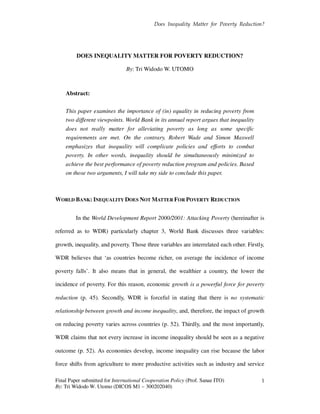This document summarizes opposing viewpoints on whether inequality matters for poverty reduction. It discusses the World Bank's perspective that inequality does not necessarily hinder poverty alleviation if economic growth occurs. However, Robert Wade and Simon Maxwell argue that inequality complicates anti-poverty efforts and should be reduced simultaneously with poverty. The author ultimately agrees with Wade and Maxwell, concluding that inequality and poverty are intertwined and comprehensive strategies are needed that incorporate both economic and human development factors to effectively reduce poverty and inequality.









